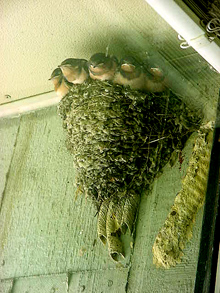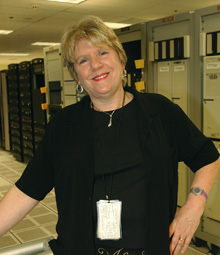 |
Wednesday, July 12, 2006 |
|
Wednesday, July 12 Click here for a full calendar with links to additional information. |
|
Extended Forecast |
Secon Level 3 |
|
Wednesday, July 12 -Portabello Harvest Grain -Santa Fe Chicken Quesadilla -Garlic Herb Roasted Pork -Beef Stroganoff -Triple Decker Club -Assorted Slice Pizza -Pesto Shrimp Linguini with Leeks and Tomatoes The Wilson Hall Cafe accepts Visa, Master Card, Discover and American Express. |
|
Wednesday, July 12
Thursday, July 13
Chez Leon Menu |
| Fermilab Today is online at: http://www.fnal.gov/today/ Send comments and suggestions to today@fnal.gov Fermilab Today archive Hurricane Relief Page Fermilab Today PDF Version Fermilab Result of the Week archive Fermilab Safety Tip of the Week archive Linear Collider News archive Fermilab Today classifieds Subscribe/Unsubscribe to |
| DZero: Better than expected and way ahead of schedule | ||
| ||
| When dramatic changes are made to a detector, it usually takes months--or even a year--to synchronize all the pieces of the detector. But when the Tevatron resumed operations this June after a complicated three-month shutdown and upgrade project, DZero recorded collision events as soon as the first set of particles hit the detector. "This time we hit it right on," said Ron Lipton, deputy project manager for the DZero Run IIb Upgrades. "The detector has come up for physics much more quickly than anyone could have anticipated."
A major accomplishment during the shutdown was the harrowing installation of a new layer of sensors in the detector. Dubbed "layer zero," it was inserted just beneath the old inner layer to hug the beampipe inside--like placing a fresh new layer inside an onion. Since the new layer lies closer to the collision point, it will give better geographical information about objects that fly out from collisions. With 96 sensor chips Lipton described as "more robust devices than the things that were used before," layer 0 is already online and giving a much clearer picture of each fleeting collision. "We'll be able to get better time resolution on Bs mixing, which is crucial, as well as B tagging with higher signal and less background," he said. Another major success had to do with getting DZero's upgraded data-sifters, also known as 'triggers,' online quickly. "As luminosity goes up, the amount of stuff coming into the trigger is getting larger," said Lipton. "So we had to get better at figuring out what is interesting." DZero has always used three trigger levels that work in progression, sifting through data like a series of sieves with progressively finer holes. According to DZero post doc Sabine Lammers, a major success of the trigger upgrades was "clustering" energy deposited in the first trigger to make it more selective. "Clusters use algorithms to identify interesting events," she said. By clustering on the first level (rather than relying on an old, rougher method), DZero is able to weed out events before they hit the second and third triggers--giving physicists a more refined assortment of events to analyze.
Trigger upgrades for detectors designed to track charged particles and muons, as well as other overall improvements to the machine, came on line just as rapidly.
"The nearly flawless upgrade installation and extremely rapid turn-on of the upgraded detector is due to the tireless efforts of the entire team," said DZero spokesperson Jerry Blazey. To complete this upgrade, DZero partner universities were supported
by the Department of Energy and the National Science Foundation.
| ||
| *From left: Mike Mulhearn, who worked on the level 1 calorimeter trigger; Ron Lipton, deputy Run IIB project manager; George Ginther, technical integration coordinator; and Sabine Lammers, level 1 calorimeter trigger. |
|
|
MSNBC,
June 10, 2006:
New letters shed light on Einstein's love life JERUSALEM - Albert Einstein had half a dozen girlfriends and told his wife they showered him with "unwanted" affection, according to letters released on Monday that shed light on his extramarital affairs.
The wild-haired Jewish-German scientist, renowned for his theory of relativity, spent little time at home. He lectured in Europe and in the United States, where he died in 1955 at age 76. But Einstein wrote hundreds of letters to his family.
|
|
|
|
It has come to our attention that multiple e-mail fraud attempts, known as "Phishing," were sent that appeared to be initiated by Argonne Credit Union.
This false e-mail asks for the recipient to click on a link to visit an upgraded Online Banking System. If the recipient proceeds, the link directs them to a false website and asks that they login to an ACU home banking site. If you received this e-mail, consider it a fraudulent attempt to obtain your personal information and do not follow the instructions in the e-mail. If you responded to such an e-mail and provided any confidential information, please notify us immediately. Remember, ACU will never request that you login to home banking through an e-mail link. In addition, we will never ask that you submit any personal information such as your social security number or account numbers through the Internet. As always, keeping your online information secure is our utmost priority. If you have any questions or feel that your personal information has been compromised, please contact us at 630-252-5800. --Mark Leninger, Computer Security Manager |
|
Why Work at Fermilab? The Employment Department is conducting an employee survey to find out why you enjoy working at Fermilab. We will gather the comments and post them on the Employment website as another avenue to help attract candidates to Fermilab. Click here to start the survey. It should take you about 2-3 minutes to complete.
Fermilab Barnstormers Today
|


